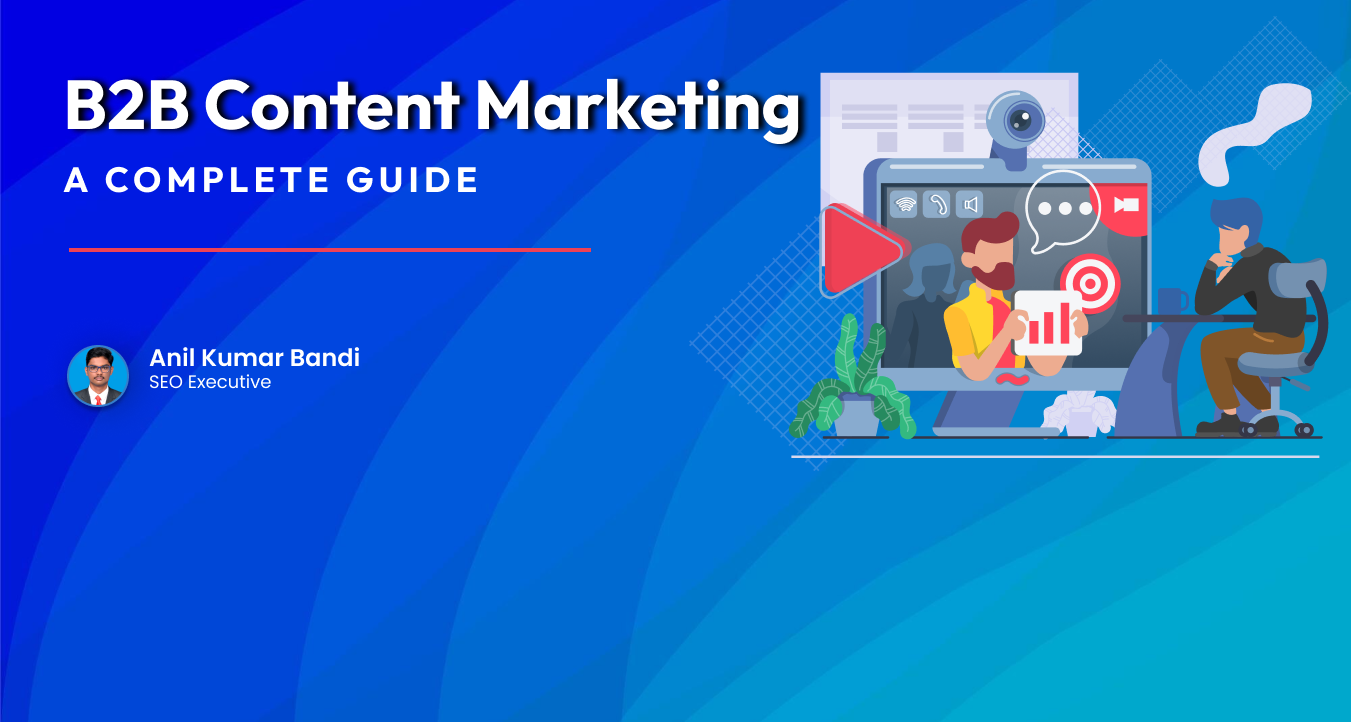Businesses are preemptively struggling for trust, engagement, and at long last loyalty in today's digital environment rather than unambiguously attempting to get people to notice them. What better tool than B2B content marketing for achieving these goals?
What is B2B content marketing?
B2B content marketing is a type of marketing that targets other businesses instead of individual consumers. It involves creating and sharing valuable content that addresses the specific needs and challenges of those businesses.
The goal of B2B content marketing is to:
1. Increase brand awareness
2. Generate leads
3. Drive sales
4. Build trust and credibility
Why is B2B content marketing Important?
- According to the Gen Demand Report, Content is said to assist in decision-making by 67% of B2B buyers.
- A stunning 81% of marketers, according to the Content Marketing Institute, think that content marketing is a fundamental business strategy and a major factor in success.
These statistics make it quite evident that B2B content marketing is now necessary and no longer an afterthought. By continually offering your target audience relevant material, you're nurturing engagement, garnering their confidence, and helping to establish your company as more than just a supplier
How do you begin, though? Which kinds of content are appealing to B2B audiences? How are successes measured? These are but a handful of the topics we will be delving into in this blog post sequence.
Difference between B2B and B2C Content Marketing
While alluring and engaging audiences is the objective of both B2B and B2C content marketing, the target population tally and plucking up journeys of both categories differ fundamentally, paving the way to significant variations in their approach.
Target Audience Specifications:
- B2B: Logic-based, risk-averse decision-makers seeking returns on investment.
- B2C: Emotionally aroused people influenced by their own needs and wants.
Formats and Types of Content:
- B2B: Extensive white papers, webinars, industry reports, case studies, and blog entries featuring insights derived from data.
- B2C: Captivating images, short videos, interesting social media posts, and poignant narratives.
Sales Cycle Variations:
- B2B: Lengthier cycles entailing analysis, contrast, and agreement from multiple stakeholders.
- B2C: Decisions are made faster, frequently on the whim of the moment, in response to pressing demands and emotional cues.
Making B2B content that resonates requires an understanding of these distinctions. Pay attention to:
- Creating a culture of trust and leadership in thought.
- Supplying insightful and useful ideas.
- Taking care of business issues and problems.
- Content adapted to particular phases of decision-making.
Understand that B2B content marketing is a journey rather than a quick fix. Deliver insightful and helpful data for your audience to help them throughout their buying journey and unleash success.
B2B Content Marketing Best Practices
-
Generating Relevant and Targeted Content:
- Investigate extensively to learn about the requirements and preferences of your audience.
- Provide information that provides solutions and solves specific issues.
-
Integrating Analytics and Data:
- Make use of data to recognise patterns, inclinations, and areas in need of development.
- Evaluate content performance to make plans more effective.
-
Developing Thought Leadership:
- Establish your brand as an acknowledged authority in the area by imparting insightful expertise and abilities.
- Make unique, thought-provoking material to differentiate your brand.
-
Acquiring Leads via the Sales Funnel:
- Provide material that corresponds to the different stages of the buyer's journey.
- Leads can be directed down the funnel by using customised content and email nurturing programmes.
-
Integrating Content with Sales Strategies:
- To assist the sales team, and align content with messaging and sales targets.
- Provide sales representatives with pertinent content to encourage dialogue and leads.
-
Monitoring and Evaluating Performance:
- Keep checks on important performance metrics (KPIs) like ROI, conversion rates, and engagement.
- Analyse data to find strategies that work and places that could be used better.
-
Maintaining an Agile and Adaptive Approach:
- Keep an eye out for changes in the market and modify content strategies as necessary.
- Be prepared to try new things and change your strategy in response to criticism and outcomes.
Tools and Resources for B2B Content Marketing
Effective B2B content creation involves more than just ideas. The correct tools increase effectiveness and influence. A peek at some key categories are as follows:
-
Content Management Systems (CMS):
- HubSpot
- WordPress
-
Analytics and Reporting Tools:
- Google Analytics
- Buzzsumo
-
Content Creation and Distribution Platforms:
- Canva
- Mailchimp
Check out our in-depth guide to B2B content marketing resources and tools. Understand the best content management systems for efficient content management. Make use of robust reporting and analytics tools to monitor results and adjust tactics. Discover platforms for content creation and distribution to streamline production and expand audience. Having the relevant tools at your discarding will help you stay ahead in the cutthroat B2B market.
In a nutshell, B2B content marketing is an indispensable strategy in today's digital scenery because it clears the way for the development of engagement, trust, and commercial success. With data demonstrating its substantial influence, it's obvious that B2B content marketing is now a need rather than a last-minute idea.
Let's look forward to future trends as we set out on this exploration, hunting through best practices and digging into the subtle differences between B2B and B2C initiatives. Here's a glimpse into the future:
- Personalization and AI
- Interactive & Immersive Experiences
- Voice Search & Audio Content
- Micro-Content & Snackable Formats
- Building Communities & Advocacy
Through the adoption of these trends and an emphasis on continuous value generation, businesses may maintain their competitive edge and utilise business-to-business content marketing to attain enduring prosperity. Therefore, staying ahead in the ever-changing B2B market demands agility and openness to adapt to everything from AI-driven analytics to personalised content experiences.




